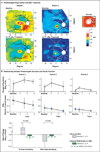Improvement and decline in vision with gene therapy in childhood blindness
- PMID: 25936984
- PMCID: PMC4450362
- DOI: 10.1056/NEJMoa1412965
Improvement and decline in vision with gene therapy in childhood blindness
Abstract
Retinal gene therapy for Leber's congenital amaurosis, an autosomal recessive childhood blindness, has been widely considered to be safe and efficacious. Three years after therapy, improvement in vision was maintained, but the rate of loss of photoreceptors in the treated retina was the same as that in the untreated retina. Here we describe long-term follow-up data from three treated patients. Topographic maps of visual sensitivity in treated regions, nearly 6 years after therapy for two of the patients and 4.5 years after therapy for the third patient, indicate progressive diminution of the areas of improved vision. (Funded by the National Eye Institute; ClinicalTrials.gov number, NCT00481546.).
Figures


Comment in
-
Long-term effects of retinal gene therapy in childhood blindness.N Engl J Med. 2015 May 14;372(20):1954-5. doi: 10.1056/NEJMe1503419. Epub 2015 May 4. N Engl J Med. 2015. PMID: 25938534 No abstract available.
-
Gene therapy for inherited blindness disorder improves eyesight in short term, study shows.BMJ. 2015 May 4;350:h2376. doi: 10.1136/bmj.h2376. BMJ. 2015. PMID: 25944017 No abstract available.
References
-
- Bainbridge JWB, Smith AJ, Barker SS, et al. Effect of gene therapy on visual function in Leber’s congenital amaurosis. N Engl J Med. 2008;358:2231–2239. - PubMed
-
- Farrar GJ, Millington-Ward S, Chadderton N, Mansergh FC, Palfi A. Gene therapies for inherited retinal disorders. Vis Neurosci. 2014;31:289–307. - PubMed
Publication types
MeSH terms
Associated data
Grants and funding
LinkOut - more resources
Full Text Sources
Other Literature Sources
Medical
